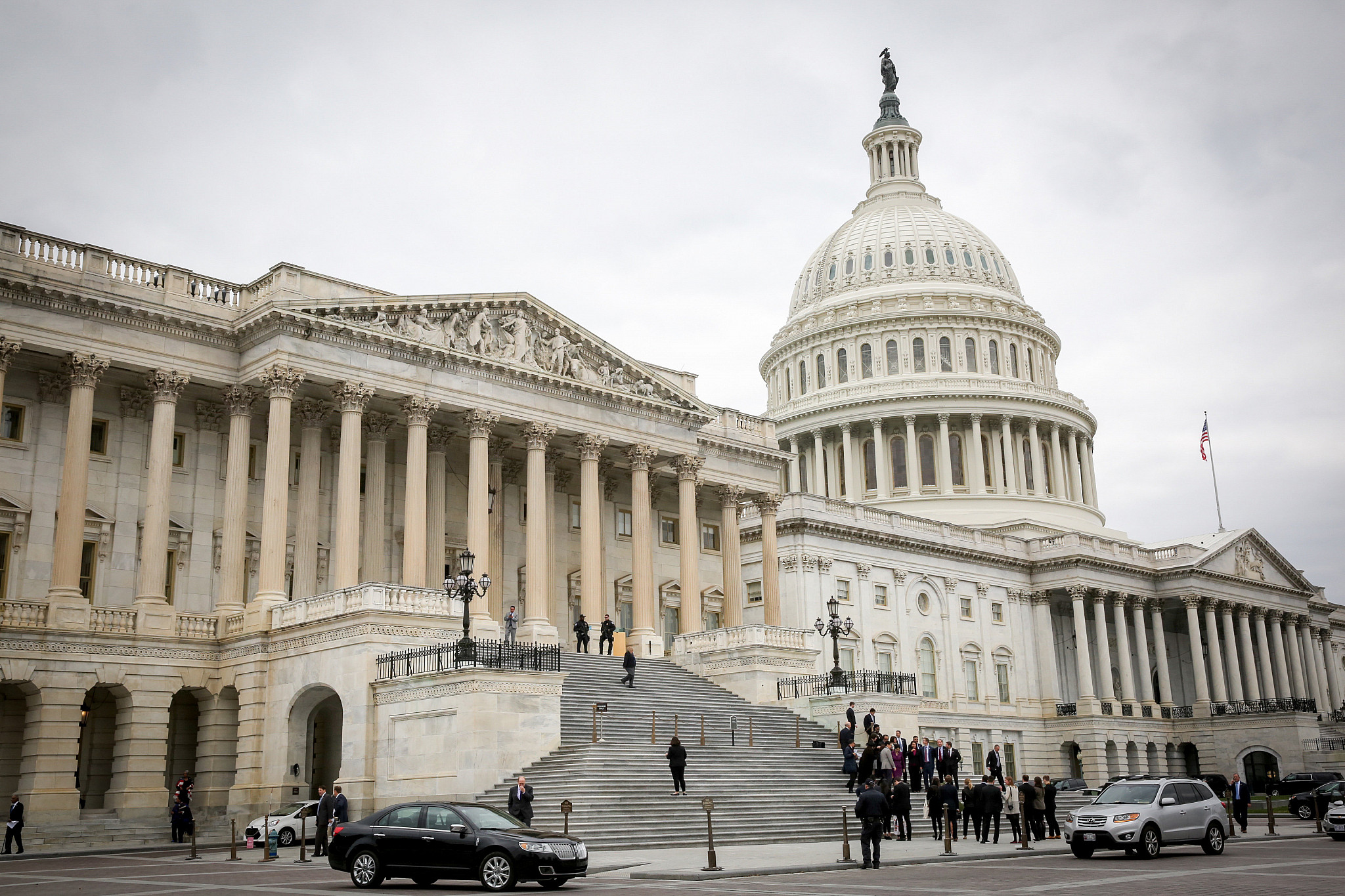In a dramatic ordeal last month, the U.S. House of Representatives voted overwhelmingly — by 420 votes to 9 — to grant an extra $1 billion to Israel to replenish Iron Dome, a missile system used to intercept rockets fired by militias particularly from the Gaza Strip. At first glance, this move sounds like business as usual on Capitol Hill, and yet another achievement for the powerful pro-Israel lobby in Washington. But in fact, this was anything but business as usual.
While the landslide vote was certainly a mixed blessing, the public fight that unfolded over the Iron Dome funding represents a significant step forward for the Palestinian rights movement. For all the handwringing by American politicians about protecting civilians and ensuring Israeli security, the question at the heart of the U.S. debate on Iron Dome is not about the military system itself; rather, it is about who is going to pay for it. As a result, the drama on the House floor has succeeded in widening a conversation that Israel’s American supporters would prefer to avoid — if not entirely silence.
The story began with a completely unrelated bill aimed at raising the national debt ceiling to fund the U.S. government for the coming weeks. The bill was expected to pass in the House despite Republicans making it clear that they were going to unanimously reject it. However, in its final stages, Democratic leaders decided to allocate an additional $1 billion for Israel’s Iron Dome system. This was money that Republican Senator Lindsey Graham had initially promised to former Prime Minister Benjamin Netanyahu after Israel’s devastating war in Gaza in May, with leading figures from both parties rushing to support the idea, including President Joe Biden.
This legislative move is not unprecedented in Congress; in the past, benefits for Israel would be inserted into unrelated bills and routinely slid by unopposed, and Democratic leaders doubtless expected the same this time. But they were in for a surprise. With Republicans lined up against the bill and only a thin Democratic majority in the House, some progressive Democrats — who were either critical of Israeli policies or displeased by the last-minute maneuver — found themselves with significant leverage in the House. They threatened to vote against the entire debt bill unless the Iron Dome clause was removed — and the Democratic leadership had no choice but to do so.

In response to this rare showing of clout, however, House Majority Leader Steny Hoyer, one of the most trusted allies of the American Israel Public Affairs Committee (AIPAC), had Connecticut Democratic Rep. Rosa DeLauro introduce a stand-alone bill to provide the Iron Dome funding, which passed with overwhelming support, including from Republicans who had opposed the original bill.
Aid upon aid upon aid
The Iron Dome saga was a keen demonstration of both the absurdity of blind congressional support for Israel, and the change, albeit a slow one, of the political playing field on Capitol Hill. During the vote on the separate Iron Dome bill, one Democrat after another stood up to support it, while Republicans — who were all prepared to vote against the funding when it was part of the larger debt bill — suddenly tried to paint the Democrats as “anti-Israel” and even antisemitic for removing the provision from the original bill.
Nonetheless, the spectacle delivered some important moments that further exposed the increasingly bitter wrangling within the Democratic Party over Israel. The most dramatic was the speech from Michigan Rep. Rashida Tlaib, the only Palestinian-American currently in Congress. Tlaib pulled no punches, pointedly telling the House, “We cannot only be talking about Israel‘s need for safety at a time when Palestinians are living under a violent apartheid system,” further citing the fact that prominent human rights groups are now describing Israel as an “apartheid regime.”
Rep. Ted Deutsch, a close AIPAC ally in the Democratic Party, denounced Tlaib minutes later, claiming her words were “consistent with those who advocate for the dismantling of the one Jewish state in the world. When there’s no place on the map for one Jewish state, that’s antisemitism.” Several Republicans echoed Deutsch’s sentiments. The ludicrousness of calling a Palestinian-American antisemitic for questioning the occupying power that rules over her family was evident for many observers.
Two other notable moments occurred involving House Speaker Nancy Pelosi. During the vote on the standalone bill, Pelosi appeared to press Rep. Alexandria Ocasio-Cortez, who had initially voted against the extra Iron Dome funding, to change her vote to “present,” to which AOC ultimately agreed. AOC later tried to explain her decision as both a protest of the procedural disorder and a reflection of the divisions among her constituents about Iron Dome. Still, it was a political mistake on her part: pro-Israel forces are unlikely to forget her “no” vote on the initial Iron Dome provision, and supporters of Palestinian rights — which includes much of AOC’s base of support — were profoundly disappointed in what they saw as her backing down to the pro-Israel lobby.

Pelosi later made a grossly misleading statement in her brief time speaking in support of the bill during the debate. While she correctly noted that Iron Dome was under the purview of the 2016 U.S.-Israel Memorandum of Understanding, which committed $38 billion in military aid over ten years, she then added that, “The funding being appropriated today simply continues and strengthens this support.” Many may misinterpret these words as indicating this money was already promised to Israel, but this is far from the case. U.S. military aid to Israel includes $500 million per year for Iron Dome, the purpose of which is to keep Israel stocked with the interceptor missiles. The new appropriation was in fact added on top of the usual aid, ostensibly because Israel used much of its stockpile during the latest escalations in May.
This obfuscation is important to note because, in truth, Israel does not need the additional money for Iron Dome: if it were in such a crisis, it could easily afford to buy the interceptor missiles on its own. As Haaretz‘s Anshel Pfeffer pointed out, the $3.8 billion of annual U.S. aid to Israel amounts to only three percent of Israel’s total budget. That is significant, but as Pfeffer put it, “after some short-term budgetary adjustments, Israel could do fine without the U.S. money.” Moreover, many on the Israeli right have openly said that they prefer to end their reliance on U.S. aid and forego the perceived restraints that Washington puts on Israeli activities. Why, then, does Israel continue to insist on receiving the aid, and why is it such a particular passion for Israel’s U.S. supporters?
Not a ‘purely defensive system’
The real issue at play is the matter of who is actually footing the bill for Israel’s “purely defensive weapon” — and who is profiting from the existing arrangement. Logistically, the Iron Dome system is built and supplied by the U.S. company Raytheon, a major weapons contractor. The $1 billion that the House just approved for the system, as well as the half-billion dollars granted annually, essentially ends up at Raytheon, just as it would if Israel were spending its own money. Unsurprisingly, Raytheon and other defense contractors want Israel to keep receiving such copious amounts of aid, and thus lobby Congress to make sure that money continues to flow.
Politically, and perhaps more importantly, the answer to the Iron Dome puzzle lies in the short-term budget adjustments mentioned by Pfeffer that Israel would have to make to cover the system on its own — which would require Israel to make some crucial decisions. Where would the Israeli money for Iron Dome come from? Education budgets? Social welfare programs? Funds for West Bank settlements? With time, a public debate threatens to be sparked over the cost of Israel’s military occupation and its aggressive regional policies, something it has not had to engage with for years thanks to U.S. largesse.

Indeed, few policymakers abroad recognize how little the occupation costs Israel, with Europe and Arab governments bearing most of the burden of supporting the Palestinian Authority’s security forces and public services, and the United States supporting Israel’s security budget. Freed from those costs, Israel has considerably less incentive to end its occupation and grant Palestinians their rights. Threatening U.S. aid therefore threatens to offer Israeli citizens a strong economic incentive to find a path toward freeing Palestinians from the current apartheid regime, an incentive to which they are not currently tempted.
Iron Dome reflects these same dynamics. Despite one member of Congress after another repeating the mantra that it is a “purely defensive system,” the rocket interceptor is one of the most significant weapons in Israel’s arsenal and plays a powerful role in its rule over Palestinian lives. When one side in a conflict is an occupying power with an overwhelming advantage in weaponry and is equipped with a shield, that shield is not merely a defensive weapon: it is a means of attacking with greater impunity.
In an ideal world, it would be preferable if all weaponry was something like Iron Dome, whose purpose is to intercept and prevent incoming attacks. But that is not the world we live in. Iron Dome may technically be defensive, but in practice, it is a powerful enabler of aggression. That truth is not self-evident, and given the nature of Iron Dome, it seems counterintuitive.
That, however, is why the Iron Dome vote last month was a victory for Palestinian rights. With overwhelming bipartisan support and the solid backing of the president, Congress was always going to approve funding for replenishing the system. But by forcing the vote into the open, progressives were able to open a public conversation about the impact of this system on Palestinian lives. Despite the subsequent attacks and the overwhelming support for Iron Dome, this was a necessary step in questioning the U.S. taxpayer’s role in sustaining such a system, as well as another step toward widening the debate on U.S. military aid to Israel more broadly.
It remains crucial that the public debate on Iron Dome continue, and to do that, the image of it as a “purely defensive system” must be problematized. This is a process that started on the House floor, and is continuing in media and public conversations. For many supporters of Palestinian rights in the United States, this moment may have felt like a defeat. But it was still a victory in disguise for the struggle to shift U.S. policy away from the harm it causes Palestinians and, yes, Israelis too.

